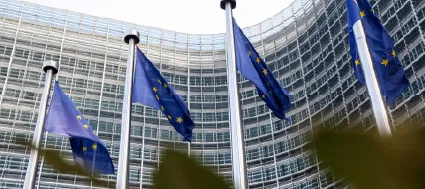Is the EU Foreign Subsidies Regulation Delivering on Its Promise After Two Years of Implementation?
November 11, 2025
The EU Foreign Subsidies Regulation (FSR) has now been in force for over two years, and its implementation has proven to be quite challenging. As the dust settles, the question remains: is the FSR truly delivering on its promise of a level playing field, or is it just adding new layers of complexity for companies and authorities alike?
At a recent conference organized by PwC Legal, in partnership with ACC Europe, in Brussels on October 22, 2025, policymakers, enforcers, academics, industry leaders, in-house counsel and senior legal practitioners gathered together to discuss the state of the art and the emerging challenges and compliance issues of this ambitious regulation.
The event featured keynote speakers such as Enrico Letta (EU Rapporteur on the Future of the Single Market, President of the Jacques Delors Institute and former Italian Prime Minister), Antonio Nicita (Italian Senator, former Commissioner of the Italian Communication Authority and member of the EC Regulatory Scrutiny Board, Full Professor of Economic Policy at LUMSA University), senior officials of the European Commission (Henri Piffaut, DG COMP; Bonifacio Garcia Porras, DG GROW, Head of the "Foreign Subsidies" Unit), renowned journalists and academics (Francesca Micheletti, Politico; Lewis Crofts, Mlex; Lena Hornkohl, University of Vienna; Ester Latorre; University of Piemonte Orientale; Pierfrancesco Mattiolo, University of Antwerp), industries representatives (Linlin Liang, China Chamber of Commerce to the EU; Bin Ye, Chinese Academy of Social Sciences) as well as expert in-house counsel (Carmelo Fontana, Google Italia; Camilla Cocuzza, Ely Lilly Italia; Hubert Klinger, Siemens Germany).
The FSR’s Genesis and Evolution from the Policymakers’ Perspective
With geopolitical tensions and trade conflicts on the rise, the FSR has become increasingly relevant in the broader effort to strengthen the single market and create a Europe “more open in a less naive way”, as advocated by Enrico Letta, by balancing trade openness with robust safeguards against unfair foreign subsidies.
The erosion of Europe’s negotiating leverage in trade and security and the vulnerability to external influence, as well as the lack of European champions, were highlighted as concrete costs of the fragmentation resulted from the increasing national power retention, especially after the euro crisis and Brexit.
Five areas were identified by Enrico Letta as priority gaps: (i) financial services (ii) energy (iii) connectivity (iv) the operationalization of the optional EU-wide legal fast track (“28th regime”) - initially piloted in startups - to offer harmonized compliance without forcing member state to repeal national law and (v) the “fifth freedom” of innovation and knowledge mobility, including diploma recognition.
Operationally, Letta encouraged a pan-European approach and the Commission’s active pursuit of major trade openings in 2025 (notably with India, Mercosur, Mexico and Indonesia), proposed converting directives into regulations to eliminate divergent national transpositions and ensure uniformity, promoted the adoption of the 2028 deadline as a mobilizing political objective and a clear Commission roadmap with measurable milestones, and, finally, urged for transparent communication from EU institutions to incentivize public support and preserve investors’ confidence.
On the other hand, to ensure that the FSR is both effective and proportionate to this objective, by correcting distortions without deterring investment or imposing excessive compliance burdens, a more targeted and economically grounded application of the FSR was advocated by Antonio Nicita.
A key tension emerged indeed between two paradigms: the “fairness” approach, which treats foreign subsidies as inherently unfair - preventing foreign firms from gaining an unfair advantage through subsidies not available to EU firms - and the “competition” approach, which requires evidence of actual market distortion. Nicita argued that simply identifying a subsidy is not enough; authorities must demonstrate negative competitive effects using established antitrust tools such as market definition, dominance, and innovation impact.
He thus called for the European Commission to publish formal economic impact assessments and develop data-driven balancing tests as well as to provide clearer thresholds and sector-specific guidance to reduce legal uncertainty and compliance costs, especially in procurement, where subsidy-driven distortions are most acute.
Challenges perceived by the Industry in M&A and PP projects
Burdensome data and documentation requirements, lack of predictability due to uncertain definitions, as well as overlaps with several other regulatory screenings, such as national FDI and EU merger control, are just some of the hurdles identified by companies, academics and practitioners, which make it difficult to plan an M&A or public procurement (PP) project with confidence.
Overall, academics and in-house counsel welcomed the FSR’s level playing field intent and the correction of the regulatory asymmetry with the general prohibition of EU state aid, but warned about the possible deterrent effect that those excessive burdens and potential delays could have on investments, and ultimately on EU’s competitiveness, which is already prompting some subsidized bidders to withdraw from tenders and loose M&A opportunities, particularly in fast-moving sectors.
The FSR has been perceived particularly burdensome and disproportionate by Chinese companies, with procurement withdrawals and € 2.1 billion in estimated opportunities losses.
Concerns about unequal obligations for foreign investors and non-discrimination commitments under bilateral investment treaties, particularly with China, were also raised, while from the other side of the Atlantic, FSR seems to be perceived more as a mere compliance issue.
In response to those challenges, the academia and industry advocated for clearer, more practical guidelines, streamlined and harmonized procedures, such as a “one-stop-shop” mechanism, as well as to settle to simplified declarations and/or annual master filings to ease compliance in those scenarios where the FSR requirements are proven to be disproportionate, such as typically in sole-supplier PP scenarios for pharmaceuticals.
From a practical perspective, a dedicated panel on FSR project management held by PwC Legal emphasized the importance of acting immediately to build multidisciplinary teams, centralize group-wide data gathering, and leverage technology. FSR compliance should not be a one-off task but implemented within the companies’ ongoing compliance processes.
The Road Ahead: Clarity and Simplification
From the enforcer’s viewpoint, the FSR remains an enforcement priority, but it is still a young and evolving instrument, “teething, and sometimes biting,” with practical challenges and two core challenges ahead.
First of all, in order to address transparency and uncertainty issues, arising also from the lack of published decisions from Phase I reviews, the Commission is aiming at providing practical clarifications in the forthcoming final version of the guidelines (due by January 2026) especially around key concepts such as “distortion”, “balancing test”, “call-in”, “reasonable suspicion” for market investigations as well as “unduly advantageous” tenders. To this end, multi-lingual electronic procurement forms are also on their way.
Secondly, provided that the number of notifications (about 200 M&A notifications to date and over 3,500 PP submissions) was very much higher than anticipated, and only a small fraction lead to in-depth investigations (only one published M&A decision to date and one M&A in-depth investigation ongoing), possible procedural reforms will be assessed by the Commission in the upcoming review of the regulation (due by July 2026), in order to focus the limited resources available on truly risky deals and conducts. In any case, a country-agnostic approach, rigorous and fair with discretion limited to procedural safeguards, aimed at targeting genuinely distortive foreign subsidies, is and will be guaranteed.
You may also like








